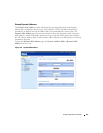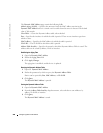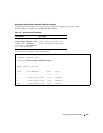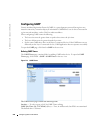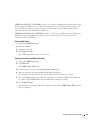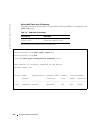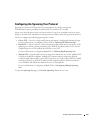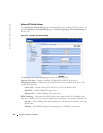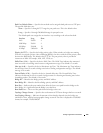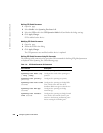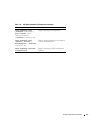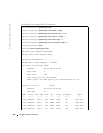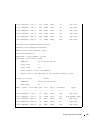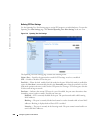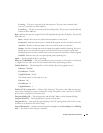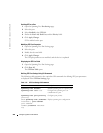
Configuring Switch Information 275
Path Cost Default Values
— Specifies the method used to assign default path costs to STP ports.
The possible field values are:
Short
— Specifies 1 through 65,535 range for port path costs. This is the default value.
Long
— Specifies 1 through 200,000,000 range for port path costs.
The default path costs assigned to an interface vary according to the selected method:
Priority (0-65535)
— Specifies the bridge priority value. When switches or bridges are running
STP, each is assigned a priority. After exchanging BPDUs, the device with the lowest priority value
becomes the Root Bridge. The default value is 32768. The port priority value is provided in
increments of 4096. For example, 4096, 8192, 12288, etc.
Hello Time (1-10)
— Specifies the device Hello Time. The Hello Time indicates the amount of
time in seconds a root bridge waits between configuration messages. The default is 2 seconds.
Max Age (6-40
) — Specifies the device Maximum Age Time. The Maximum Age Time indicates
the amount of time in seconds a bridge waits before sending configuration messages. The default
max age is 20 seconds.
Forward Delay (4-30)
— Specifies the device forward delay time. The Forward Delay Time
indicates the amount of time in seconds a bridge remains in a listening and learning state before
forwarding packets. The default is 10 seconds.
Bridge ID
— Identifies the Bridge priority and MAC address.
Root Bridge ID
— Identifies the Root Bridge priority and MAC address.
Root Port
— Indicates the port number that offers the lowest cost path from this bridge to the
Root Bridge. It is significant when the Bridge is not the Root.
Root Path Cost
— The cost of the path from this bridge to the root.
Topology Changes Counts
— Specifies the total amount of STP state changes that have occurred.
Last Topology Change
— Indicates the amount of time that has elapsed since the bridge was
initialized or reset, and the last topographic change occurred. The time is displayed in a D/H/M/S
format, for example, 2D/5H/10M/4S.
Interface Long Short
LAG 20,000 4
1000 Mbps 20,000 4
100 Mbps 200,000 19
10 Mbps 2,000,000 100



